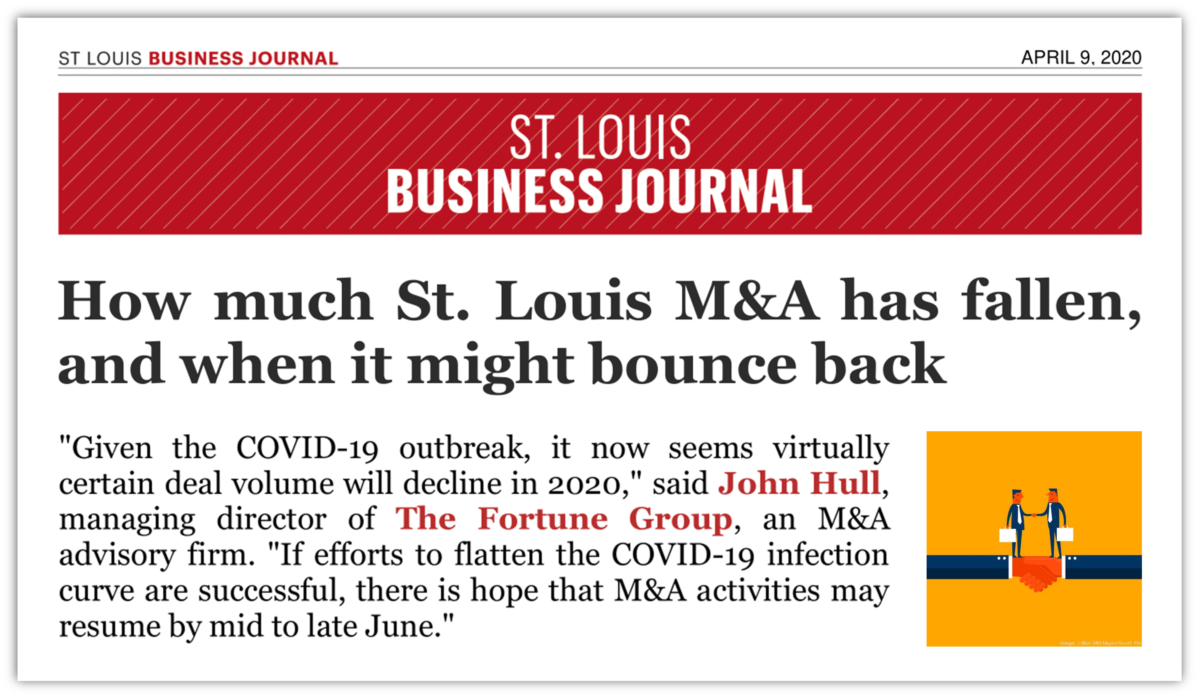The COVID-19 pandemic is having a significant impact on the global economy with most experts forecasting a sharp decline in the global GDP for 2020, with the possibility the residual impact continues into 2021. M&A activity had started to soften prior to the COVID-19 outbreak, and it is now expected that M&A activity will be lower for the remainder of 2020.
In a recent St. Louis Business Journal article, John Hull, Managing Director at The Fortune Group, discussed the M&A slowdown, including the St. Louis market where deal volume fell in March. John said there has been little in the way of new transaction activity since the middle of March and that most transactions which were underway at the time of the outbreak have been put on hold or are moving forward more slowly.
While it is too early to understand or evaluate the ultimate impact that the COVID-19 outbreak may have on the M&A market we want to share with you what we are currently seeing in the market based on our discussions with M&A industry participants, including our clients, buyers, banks and other financing groups, and fellow members of our global network of M&A advisors (AICAnetwork.com).
- After a period of record M&A activity over the past decade, dealmakers now face unprecedented disruption. In the near term, we’re quickly switching from a long-running seller’s market to one favoring buyers—especially those in relatively strong capital positions. For sellers, the tide is turning from contemplating broad sale processes to prioritizing speed and certainty to get a deal signed and closed.
- As infection curves are flattening, the focus has turned to the recovery—the length and pace of which will depend on the resolution of the health threat, economic policy, response of people and firms, and labor-market conditions. These factors will play a direct role in a rebound of transaction activity and M&A market participants themselves.
- There will certainly be some winners amid the chaos, but in the near-term we are likely to be faced with a flight to safety, reduced access to traditional capital sources, increased reliance on seller financing and earn-outs as well as increased scrutiny of deal terms.
- The private equity industry, which has trillions of dollars to invest, may be one beneficiary of the drastic devaluation of investment opportunities, but they will likely have their hands full managing existing portfolio companies.
- Moving forward, lenders are expected to take a more cautious approach to underwriting and funding new deals. In a tighter lending environment with rising debt financing costs, buyers that rely on leveraging acquisitions with debt—such as private equity firms—will be forced to structure transactions with more conservative capital structures that include larger equity contributions.
- Quality of earnings assessment will be critical as companies are facing multiple extraordinary, unusual or non-recurring expenses, such as sanitization, inventory loss, idle facilities or closed locations, new employee training and adjusted marketing campaigns. All of these expenses could affect a company’s EBITDA and valuation as either a potential buyer or seller, so they will need to be considered in deal modeling on all current transactions.
- There will be a resurgence in distressed/workout activity—anticipated for some time, given the longevity of the seller’s market. Good companies (or not so good) with bad balance sheets will drive debt restructuring and refinancing activity that will accelerate and characterize much of the deal activity heading into 2021.
Notwithstanding the current conditions and regardless of their near-term impact, there will continue to be M&A opportunities for well-managed companies that have performed well during the COVID-19 pandemic and those companies that are positioned to rebound quickly as the economy begins to reopen. In the aftermath of previous crises, such as the 9/11 Attacks and the Great Recession the M&A market experienced a smaller number of total deals and lower overall transaction values, but the market for attractive companies remained resilient, particularly for middle market deals. We expect the same scenario to play out again in the M&A market as buyers and sellers navigate the current crisis.




